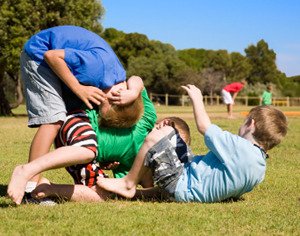THE FATHER-CHILD BOND : IMPORTANCE OF ROUGH & TUMBLE PLAY

During the last few months I have dedicated a lot of my time in exploring the field of Psychology and especially the importance of social interactions between human beings. An area that I am especially interested in is the parent-child relationship. Growing evidence suggests that core elements of our personality develop almost to their entirety within the first 5-6 years of our lives, a discovery which underlines even more, the importance of the parent. We live in an era of intense debates around the topic of how exactly we should be raising our kids. The public opinion seems to be shifting towards the direction of over-protecting our kids, through attempts to control and monitor every aspect of their lives, treating them more and more like our precious and fragile possessions, panicking every time something goes beyond our control. Direct result of our over-protectiveness and often tyrannical control over our children, is a spike in the diagnosis of a plethora of psychiatric conditions varying from ADHD, all the way to Major Depression. And how do we deal with this? By attempting to protect, monitor and control our children even more.
I have been especially interested in the role of the father in a child’s life. Humans are a species where the importance of the father is highly evident through the clearly higher rate of paternal involvement that we exhibit compared to other species of the animal kingdom. Due to our extremely oversized head-to-body ratio as babies, we have to be born into this world ‘prematurely’. Whereas in other species, the offspring can become fully functional and independent within a relatively short period of time, in humans this process takes a very long time. The physically weaker human female of our ancestors living in the ‘wild’, would find it impossible to care, feed and keep safe one or more children (and herself) for several years without the vital presence of the father. In modern literature there is actually an overwhelming amount of evidence pointing out the disadvantages of children who grow up without a competent, continuously present father figure. You will very rarely hear this in the feminist, politically-correct, main-stream media, but kids who grow up without a paternal guidance are more likely to suffer from psychiatric disorders, drop out of school, be aggressive, be involved in criminal activity and less likely to have long-term employment and create a steady family environment of their own.

A common activity between the child and the father is the so called ‘Rough-and-Tumble play’. This includes playful activities such as chasing, wrestling, tickling, rolling and mock-fighting, which may appear rough and violent and are often discouraged by the more nervous and worried female half of our species. These type of activities, even though most common in boys, are equally important in the development of girls as well. Research suggests that the frequency of such playful activities during the ages of 2-8 is becoming less and less, due to the continuously changing environment in which our kids grow, as well as our approach to parenting. Nevertheless there seems to be a glimpse of hope, as now various Psychology Journals as well as Parental Organisations, are beginning to encourage and promote such activities in an attempt to make them again a vital part of the parent-child relationship. But how do these ‘aggressive’ and intense games actually help a child’s development?
The Limits of the Human Body
Like in every other animal, playing at a young age is a way to re-create various real, adult-life scenarios and practice various behaviours. Children learn what causes pain and what can hurt their own bodies but at the same time they learn what can damage other people and are therefore taught a very important lesson on how much force and human contact is socially acceptable. It teaches children coordination, muscle control and fine tuning while it gives them confidence in their own bodies. They learn the importance of using muscle power appropriately and are also taught a lesson about the consequences that excessive force can have.
The Development of Social Skills
Rough play is both about learning and testing the limits of social interactions with adults and other children. Kids can learn about group activity, how to interact with peers and how to become an acceptable member of a social group. They are being taught important lessons about hierarchy and dominance, leadership and negotiation, while they test and learn social boundaries. Experiments in rats have proven that animals who are not allowed to rough-play at a young age, can become socially awkward and are far less likely to respect the boundaries of others but also at the same time do not know how to properly defend their own. Both young rats and humans who didn’t experience these types of games, are more likely to be socially isolated and be rejected by peers.
The Difference between Aggression and Assertiveness
Even though rough play may seem violent, it is actually very unlikely to result into serious harm or escalate into real violence. The social limits imposed by the group, as well as the always important parental guidance can help children learn the difference between playing and fighting and of course the difference between aggression and standing up for your own self. They learn how to read people’s mood and intentions and receive important lessons in what reaction is appropriate for which situation. By experiencing the consequences of aggression both on themselves and on others, they learn about self-control and appropriate use of force. Evidence suggests that children engaging in rough play are actually less likely to be involved in violent activities as adults and can better control their anger and aggressiveness.

The raising of the children has always been a ‘social activity’ throughout our evolutionary history, with parents being in the centre of importance, but families, friends and other children contributing their part and playing their role. Just like the male lion rough-plays with the young members of his pride, humans should also learn to accept and embrace similar behaviours with their own children. Adults should be directly involved in such playful activities, providing a free but safe environment, setting the rules without becoming over-controlling or ruining the essence of rough-play. At the same time, we should also demand from our schools and kindergartens to provide such environments so that our children can grow up and learn the way they are supposed to be and the way mother-nature demands.